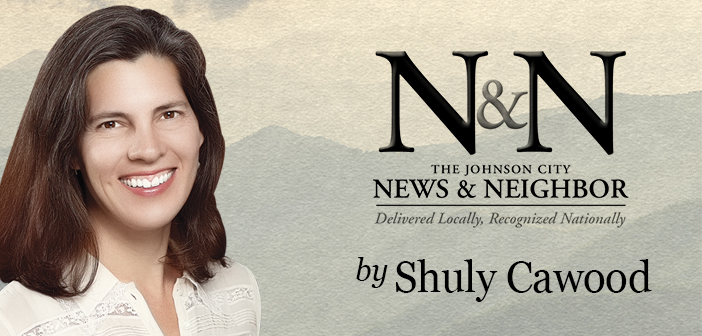The nest appeared before I noticed it being built. There it was, suddenly fully formed, all twig and leaf and bits of branch, tucked on an overhang below our front porch roof, right by our front door. Every time we left the house, every time we came in, the parent robin swooped out, perched on a branch nearby, always the same branch, a watchful eye, a chirp.
Maybe there are no eggs yet, we thought. Maybe there’s still time to move it. It’s a nuisance, having birds right by your door—the wings flapping, and the bird poop everywhere. I was cleaning the poop off the windows beside our front door, cleaning it off the floor.
My father and husband took out the ladder, peered inside, took a picture: four blue eggs, already there. Too late to stop this.
I left for a nine-day trip, and when I returned home, there they were, suddenly full formed, all soft head and tiny beak and closed eyes. Only two. The parent robin (a mom, I decided, though the truth was I didn’t know) still swooped out every time we left the house, every time we came in, but now her chirping grew more frantic as she perched on her branch nearby, the same watchful eye, and now I felt like a thief going in and out. “I’m sorry,” I said to her, I said to her babies. I did my best to quietly open the door.
Still, I got used to it, the flapping of wings, the bird poop, and even when inside the house, I’d hear the chirp of the parent robin. Or were there two? I started watching from my picture window, close to the front door. There was one pecking on the ground, another on the same old branch. They stayed nearby, all day, swooping in and out of the nest. I started listening for them. The robin chirps punctuated my day, my hour, sometimes even my minutes.
And then one morning, I walked from my front yard onto my front porch, approaching my front door, but I must not have been quiet enough, and suddenly there were wings and wings and wings tumbling from the nest: the parents flapped out and swooped away, and the two babies flapped out, too, but not away. They only made it to my front porch floor, and when they fluttered again, they couldn’t lift more than a few inches. I panicked, chastising myself for not having been gentler, slower. What should I do?
My husband said to leave them alone. But I didn’t want to. I wanted to lift them back into their nest. I waited. I waited more. From inside, I watched the baby birds hop around my front porch for a while, but the sun was getting strong. What should I do? I filled a shallow dish with water, went out my back door and walked around the side of the house to the front and placed it as softly as I could onto the porch, walked around to the back of the house again. “Don’t go out the front,” I told my husband. For hours, I fretted, flapping my own worry wings. The parent birds chirped and hopped around nearby, close to the porch. Then, one by one, the baby birds hopped off the porch and disappeared beneath our boxwood, into our bed of St. John’s wort.
By mid-afternoon, the chirping had gone away. I stepped out front: no parent birds, no baby birds. Were they all okay? I listened for the robin chirps the rest of the day and the next.
“I miss them,” I told my husband.
Now I still miss them. I’m still listening. I’m still learning.
And isn’t this what we all have to do? Learn to let them come. And then let them more easily go.
Shuly Xóchitl Cawood is a Johnson City author who teaches online writing workshops. Learn more at www.shulycawood.com.




